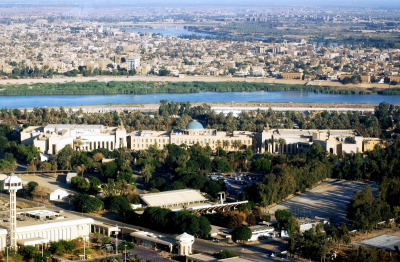The siege of Baghdad was a siege that took place in Baghdad in 1258, lasting for 13 days from January 29, 1258 until February 10, 1258. The siege, laid by Ilkhanate Mongol forces and allied troops, involved the investment, capture, and sack of Baghdad, which was the capital of the Abbasid Caliphate at that time. The Mongols were under the command of Hulagu Khan, brother of the khagan Mngke Khan, who had intended to further extend his rule into Mesopotamia but not to directly overthrow the Caliphate. Mngke, however, had instructed Hulagu to attack Baghdad if the Caliph Al-Musta'sim refused Mongol demands for his continued submission to the khagan and the payment of tribute in the form of military support for Mongol forces in Persia.
Hulagu began his campaign in Persia against the strongholds of Nizari Ismailis, who lost their stronghold of Alamut. He then marched on Baghdad, demanding that Al-Musta'sim accede to the terms imposed by Mngke on the Abbasids. Although the Abbasids had failed to prepare for the invasion, the Caliph believed that Baghdad could not fall to invading forces and refused to surrender. Hulagu subsequently besieged the city, which surrendered after 12 days.During the next week, the Mongols sacked Baghdad, committing numerous atrocities; there is debate among historians about the level of destruction of library books and the Abbasids' vast libraries. The Mongols executed Al-Musta'sim and massacred many residents of the city, which was left greatly depopulated. The siege is considered to mark the end of the Islamic Golden Age, during which the caliphs had extended their rule from the Iberian Peninsula to Sindh, and which was also marked by many cultural achievements in diverse fields.
Baghdad (; Arabic: بَغْدَاد [baɣˈdaːd] (listen)) is the capital of Iraq and the second-largest city in the Arab world after Cairo. It is located on the Tigris near the ruins of the ancient Akkadian city of Babylon and the Sassanid Persian capital of Ctesiphon. In 762 CE, Baghdad was chosen as the capital of the Abbasid Caliphate, and became its most notable major development project. Within a short time, the city evolved into a significant cultural, commercial, and intellectual center of the Muslim world. This, in addition to housing several key academic institutions, including the House of Wisdom, as well as a multiethnic and multi-religious environment, garnered it a worldwide reputation as the "Center of Learning".
Baghdad was the largest city in the world for much of the Abbasid era during the Islamic Golden Age, peaking at a population of more than a million. The city was largely destroyed at the hands of the Mongol Empire in 1258, resulting in a decline that would linger through many centuries due to frequent plagues and multiple successive empires. With the recognition of Iraq as an independent state (formerly the British Mandate of Mesopotamia) in 1932, Baghdad gradually regained some of its former prominence as a significant center of Arab culture, with a population variously estimated at 6 or over 7 million. Compared to its large population, it has a small area at just 673 square kilometers (260 sq mi).
The city has faced severe infrastructural damage due to the Iraq War, which began with the United States-led invasion of Iraq in 2003 and lasted until 2011, and the subsequent insurgency and renewed war that lasted until 2017, resulting in a substantial loss of cultural heritage and historical artifacts. During this period, Baghdad had one of the highest rates of terrorist attacks in the world. However, terrorist attacks are rare and have been declining since the territorial defeat of the Islamic State militant group in Iraq in 2017.

 English
English  español
español  français
français  português
português  русский
русский  العربية
العربية  简体中文
简体中文 
